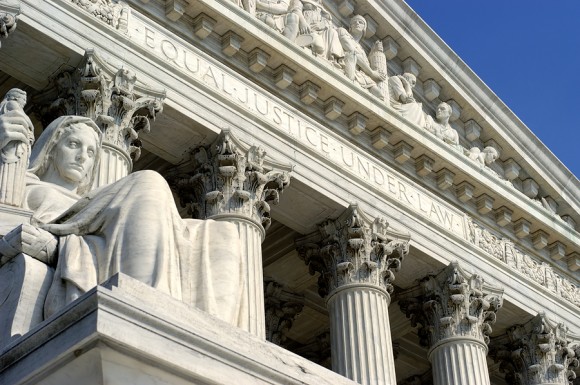The U.S. Supreme Court said the federal government can’t constitutionally withhold legal protections for trademarks seen as disparaging, throwing out a 70-year-old provision as a free-speech violation.
The ruling was unanimous, although the court splintered in its reasoning. The decision is a victory for an Asian-American dance-rock band called The Slants. The ruling could affect the outcome of a similar dispute over professional football’s Washington Redskins.
The ruling strikes down a 1946 measure that barred federal officials from putting disparaging trademarks on a government registry. The Supreme Court said the registration decisions don’t qualify as government speech, a classification that would have given officials broad power to pick and choose which messages to protect.
Writing for the court, Justice Samuel Alito said the federal trademark office had undermined the government-speech argument by registering other disparaging names, as well as trademarks on opposite sides of public policy issues.
“If the federal registration of a trademark makes the mark government speech, the federal government is babbling prodigiously and incoherently,” Alito wrote. “It is saying many unseemly things. It is expressing contradictory views. It is unashamedly endorsing a vast array of commercial products and services. And it is providing Delphic advice to the consuming public.”
Justices Anthony Kennedy and Clarence Thomas wrote separately, agreeing with much of Alito’s reasoning but not all of it. Justices Ruth Bader Ginsburg, Sonia Sotomayor and Elena Kagan joined Kennedy’s opinion. New Justice Neil Gorsuch didn’t take part in the case, which was argued before he joined the court.
Slants founder and bass player Simon Shiao Tam says his band’s name was designed to reclaim a term that has been an anti-Asian slur. The U.S. Patent and Trademark Office nonetheless refused to register the trademark after concluding the name was disparaging to a substantial number of people of Asian ancestry.
The Obama administration defended the provision, saying it didn’t prevent people from using a name or image and had no effect on the separate trademark protections available under state law. The case was argued before President Donald Trump’s inauguration.
The Obama administration also contended that federal registration is a government benefit that provides additional protections for trademarks but doesn’t have to be conferred on all applicants.
The benefits of federal registration include exclusive rights in parts of the country where no one had previously been using the name or image. Registration also puts would-be competitors on notice that a trademark is legally protected.
Tam contended the provision unconstitutionally discriminated against some trademark owners based on the viewpoint they expressed. He also said the provision was too vague, giving trademark examiners license to make subjective and even arbitrary decisions.
The case is Matal v. Tam, 15-1293.
Related:
- Supreme Court to Hear ‘Disparaging’ Trademark Case Similar to NFL’s Redskins’
- Washington Redskins, Disparaging Trademarks and Free Speech
Was this article valuable?
Here are more articles you may enjoy.



 US Supreme Court Rejects Trump’s Global Tariffs
US Supreme Court Rejects Trump’s Global Tariffs  Palantir Decamps to Miami Co-Working Space in Surprise Move
Palantir Decamps to Miami Co-Working Space in Surprise Move  Sompo Receives Regulatory Approvals to Acquire Aspen Insurance in $3.5B Deal
Sompo Receives Regulatory Approvals to Acquire Aspen Insurance in $3.5B Deal  State Farm Adjuster’s Opinion Does Not Override Policy Exclusion in MS Sewage Backup
State Farm Adjuster’s Opinion Does Not Override Policy Exclusion in MS Sewage Backup 

